Popular Utopia Books
26+ [Hand Picked] Popular Books On Utopia
Discover the list of some best books written on Utopia by popular award winning authors. These book on topic Utopia highly popular among the readers worldwide.

Utopia for Realists: How We Can Build the Ideal World by Rutger Bregman
From a universal basic income to a 15-hour workweek, from a world without borders to a world without poverty – it’s time to return to utopian thinking. Rutger Bregman takes us on a journey through history, beyond the traditional left-right divides, as he introduces ideas whose time has come. Utopia for Realists is one of those rare books that takes you by surprise and chall From a universal basic income to a 15-hour workweek, from a world without borders to a world without poverty – it’s time to return to utopian thinking. Rutger Bregman takes us on a journey through history, beyond the traditional left-right divides, as he introduces ideas whose time has come. Utopia for Realists is one of those rare books that takes you by surprise and challenges what you think you know. In the words of leading social theorist Zygmunt Bauman, it is "brilliant, truly enlightening, and eminently readable." This original Dutch bestseller sparked a national movement for basic income experiments that soon made international headlines.
I WANT TO READ THIS
Walkaway by Cory Doctorow
Cory Doctorow’s first adult novel in eight years: an epic tale of revolution, love, post-scarcity, and the end of death. Hubert Vernon Rudolph Clayton Irving Wilson Alva Anton Jeff Harley Timothy Curtis Cleveland Cecil Ollie Edmund Eli Wiley Marvin Ellis Espinoza—known to his friends as Hubert, Etc—was too old to be at that Communist party. But after watching the breakdown o Cory Doctorow’s first adult novel in eight years: an epic tale of revolution, love, post-scarcity, and the end of death. Hubert Vernon Rudolph Clayton Irving Wilson Alva Anton Jeff Harley Timothy Curtis Cleveland Cecil Ollie Edmund Eli Wiley Marvin Ellis Espinoza—known to his friends as Hubert, Etc—was too old to be at that Communist party. But after watching the breakdown of modern society, he really has no where left to be—except amongst the dregs of disaffected youth who party all night and heap scorn on the sheep they see on the morning commute. After falling in with Natalie, an ultra-rich heiress trying to escape the clutches of her repressive father, the two decide to give up fully on formal society—and walk away. After all, now that anyone can design and print the basic necessities of life—food, clothing, shelter—from a computer, there seems to be little reason to toil within the system. It’s still a dangerous world out there, the empty lands wrecked by climate change, dead cities hollowed out by industrial flight, shadows hiding predators animal and human alike. Still, when the initial pioneer walkaways flourish, more people join them. Then the walkaways discover the one thing the ultra-rich have never been able to buy: how to beat death. Now it’s war – a war that will turn the world upside down. Fascinating, moving, and darkly humorous, Walkaway is a multi-generation SF thriller about the wrenching changes of the next hundred years…and the very human people who will live their consequences. At the Publisher's request, this title is being sold without Digital Rights Management Software (DRM) applied.
I WANT TO READ THIS
Inventing the Future: Postcapitalism and a World Without Work by Nick Srnicek , Alex Williams
A major new manifesto for a high-tech future free from work Neoliberalism isn’t working. Austerity is forcing millions into poverty and many more into precarious work, while the left remains trapped in stagnant political practices that offer no respite. Inventing the Future is a bold new manifesto for life after capitalism. Against the confused understanding of our high-tec A major new manifesto for a high-tech future free from work Neoliberalism isn’t working. Austerity is forcing millions into poverty and many more into precarious work, while the left remains trapped in stagnant political practices that offer no respite. Inventing the Future is a bold new manifesto for life after capitalism. Against the confused understanding of our high-tech world by both the right and the left, this book claims that the emancipatory and future-oriented possibilities of our society can be reclaimed. Instead of running from a complex future, Nick Srnicek and Alex Williams demand a postcapitaiist economy capable of advancing standards, liberating humanity from work and developing technologies that expand our freedoms.
I WANT TO READ THIS
The Silver Siren by Chanda Hahn
Every journey has an end. Unable to find the answers she sought in Skyfell, Thalia, Joss, and Kael travel to Haven with a prisoner in tow. An attack on the road waylays their plans, and Thalia finds herself traveling alone with Kael to the hidden sanctuary of the SwordBrothers. But war is on the horizon and the Raven is amassing his army. This time, the target is not Calandr Every journey has an end. Unable to find the answers she sought in Skyfell, Thalia, Joss, and Kael travel to Haven with a prisoner in tow. An attack on the road waylays their plans, and Thalia finds herself traveling alone with Kael to the hidden sanctuary of the SwordBrothers. But war is on the horizon and the Raven is amassing his army. This time, the target is not Calandry, but the Sirens of Sinnedor. When family ties are revealed, Thalia must choose sides. Desperate to break the final seal on her power and save those she loves, will Thalia willingly taste the bitter pain of the iron butterfly machine one final time?
I WANT TO READ THIS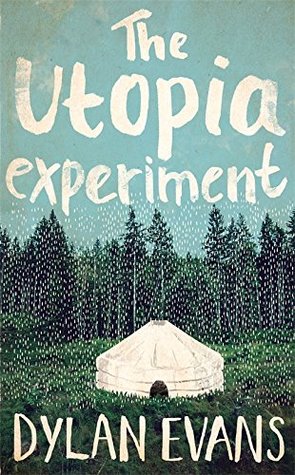
The Utopia Experiment by Dylan Evans
Imagine you have survived an apocalypse. Civilization as you knew it is no more. What will life be like and how will you cope? In 2006, Dylan Evans set out to answer these questions. He left his job in a high-tech robotics lab, moved to the Scottish Highlands and founded a community called The Utopia Experiment. There, together with an eclectic assortment of volunteers, he Imagine you have survived an apocalypse. Civilization as you knew it is no more. What will life be like and how will you cope? In 2006, Dylan Evans set out to answer these questions. He left his job in a high-tech robotics lab, moved to the Scottish Highlands and founded a community called The Utopia Experiment. There, together with an eclectic assortment of volunteers, he tried to live out a scenario of global collapse, free from modern technology and comforts. Within a year, Evans found himself detained in a psychiatric hospital, shattered and depressed, trying to figure out what had gone wrong. In The Utopia Experiment he tells his own extraordinary story: his frenzied early enthusiasm for this unusual project, the many challenges of post-apocalyptic living, his descent into madness and his gradual recovery. In the process, he learns some hard lessons about himself and about life, and comes to see the modern world he abandoned in a new light.
I WANT TO READ THIS
Four Futures: Life After Capitalism by Peter Frase
An exhilarating exploration into the utopias and dystopias that could develop from present society Peter Frase argues that increasing automation and a growing scarcity of resources, thanks to climate change, will bring it all tumbling down. In Four Futures, Frase imagines how this post-capitalist world might look, deploying the tools of both social science and speculative f An exhilarating exploration into the utopias and dystopias that could develop from present society Peter Frase argues that increasing automation and a growing scarcity of resources, thanks to climate change, will bring it all tumbling down. In Four Futures, Frase imagines how this post-capitalist world might look, deploying the tools of both social science and speculative fiction to explore what communism, rentism, socialism and exterminism might actually entail. Could the current rise of real-life robocops usher in a world that resembles Ender’s Game? And sure, communism will bring an end to material scarcities and inequalities of wealth—but there’s no guarantee that social hierarchies, governed by an economy of “likes,” wouldn’t rise to take their place. A whirlwind tour through science fiction, social theory and the new technologies already shaping our lives, Four Futures is a balance sheet of the socialisms we may reach if a resurgent Left is successful, and the barbarisms we may be consigned to if those movements fail.
I WANT TO READ THIS
Seven Surrenders by Ada Palmer
The second book of Terra Ignota, a political SF epic of extraordinary audacity. It is a world in which near-instantaneous travel from continent to continent is free to all. In which automation now provides for everybody’s basic needs. In which nobody living can remember an actual war. In which it is illegal for three or more people to gather for the practice of religion—but e The second book of Terra Ignota, a political SF epic of extraordinary audacity. It is a world in which near-instantaneous travel from continent to continent is free to all. In which automation now provides for everybody’s basic needs. In which nobody living can remember an actual war. In which it is illegal for three or more people to gather for the practice of religion—but ecumenical “sensayers” minister in private, one-on-one. In which gendered language is archaic, and to dress as strongly male or female is, if not exactly illegal, deeply taboo. In which nationality is a fading memory, and most people identify instead with their choice of the seven global Hives, distinguished from one another by their different approaches to the big questions of life. And it is a world in which, unknown to most, the entire social order is teetering on the edge of collapse. Because even in utopia, humans will conspire. And also because something new has arisen: Bridger, the child who can bring inanimate objects to conscious life.
I WANT TO READ THIS
Paradise Now: The Story of American Utopianism by Chris Jennings
For readers of Jill Lepore, Joseph J. Ellis, and Tony Horwitz comes a lively, thought-provoking intellectual history of the golden age of American utopianism—and the bold, revolutionary, and eccentric visions for the future put forward by five of history’s most influential utopian movements. In the wake of the Enlightenment and the onset of industrialism, a generation of dr For readers of Jill Lepore, Joseph J. Ellis, and Tony Horwitz comes a lively, thought-provoking intellectual history of the golden age of American utopianism—and the bold, revolutionary, and eccentric visions for the future put forward by five of history’s most influential utopian movements. In the wake of the Enlightenment and the onset of industrialism, a generation of dreamers took it upon themselves to confront the messiness and injustice of a rapidly changing world. To our eyes, the utopian communities that took root in America in the nineteenth century may seem ambitious to the point of delusion, but they attracted members willing to dedicate their lives to creating a new social order and to asking the bold question What should the future look like? In Paradise Now, Chris Jennings tells the story of five interrelated utopian movements, revealing their relevance both to their time and to our own. Here is Mother Ann Lee, the prophet of the Shakers, who grew up in newly industrialized Manchester, England—and would come to build a quiet but fierce religious tradition on the opposite side of the Atlantic. Even as the society she founded spread across the United States, the Welsh industrialist Robert Owen came to the Indiana frontier to build an egalitarian, rationalist utopia he called the New Moral World. A decade later, followers of the French visionary Charles Fourier blanketed America with colonies devoted to inaugurating a new millennium of pleasure and fraternity. Meanwhile, the French radical Étienne Cabet sailed to Texas with hopes of establishing a communist paradise dedicated to ideals that would be echoed in the next century. And in New York’s Oneida Community, a brilliant Vermonter named John Humphrey Noyes set about creating a new society in which the human spirit could finally be perfected in the image of God. Over time, these movements fell apart, and the national mood that had inspired them was drowned out by the dream of westward expansion and the waking nightmare of the Civil War. Their most galvanizing ideas, however, lived on, and their audacity has influenced countless political movements since. Their stories remain an inspiration for everyone who seeks to build a better world, for all who ask, What should the future look like?
I WANT TO READ THIS
An American Utopia by Fredric Jameson
Controversial manifesto by acclaimed cultural theorist debated by leading writers Fredric Jameson’s pathbreaking essay “An American Utopia” radically questions standard leftist notions of what constitutes an emancipated society. Advocated here are—among other things—universal conscription, the full acknowledgment of envy and resentment as a fundamental challenge to any com Controversial manifesto by acclaimed cultural theorist debated by leading writers Fredric Jameson’s pathbreaking essay “An American Utopia” radically questions standard leftist notions of what constitutes an emancipated society. Advocated here are—among other things—universal conscription, the full acknowledgment of envy and resentment as a fundamental challenge to any communist society, and the acceptance that the division between work and leisure cannot be overcome. To create a new world, we must first change the way we envision the world. Jameson’s text is ideally placed to trigger a debate on the alternatives to global capitalism. In addition to Jameson’s essay, the volume includes responses from philosophers and political and cultural analysts, as well as an epilogue from Jameson himself. Many will be appalled at what they will encounter in these pages—there will be blood! But perhaps one has to spill such (ideological) blood to give the Left a chance.
I WANT TO READ THIS
Last Futures: Nature, Technology and the End of Architecture by Douglas Murphy
Whatever happened to the last utopian dreams of the city? In the late 1960s the world was faced with impending disaster: the height of the Cold War, the end of oil and the decline of great cities throughout the world. Out of this crisis came a new generation that hoped to build a better future, influenced by visions of geodesic domes, walking cities and a meaningful connect Whatever happened to the last utopian dreams of the city? In the late 1960s the world was faced with impending disaster: the height of the Cold War, the end of oil and the decline of great cities throughout the world. Out of this crisis came a new generation that hoped to build a better future, influenced by visions of geodesic domes, walking cities and a meaningful connection with nature. In this brilliant work of cultural history, architect Douglas Murphy traces the lost archeology of the present day through the works of thinkers and designers such as Buckminster Fuller, the ecological pioneer Stewart Brand, the Archigram architects who envisioned the Plug-In City in the ’60s, as well as co-operatives in Vienna, communes in the Californian desert and protesters on the streets of Paris. In this mind-bending account of the last avant-garde, we see not just the source of our current problems but also some powerful alternative futures.
I WANT TO READ THIS
Utopia Drive: A Road Trip Through America's Most Radical Idea by Erik Reece
For Erik Reece, life, at last, was good: he was newly married, gainfully employed, living in a creekside cabin in his beloved Kentucky woods. It sounded, as he describes it, "like a country song with a happy ending." And yet he was still haunted by a sense that the world--or, more specifically, his country--could be better. He couldn't ignore his conviction that, in fact, For Erik Reece, life, at last, was good: he was newly married, gainfully employed, living in a creekside cabin in his beloved Kentucky woods. It sounded, as he describes it, "like a country song with a happy ending." And yet he was still haunted by a sense that the world--or, more specifically, his country--could be better. He couldn't ignore his conviction that, in fact, the good ol' USA was in the midst of great social, environmental, and political crises--that for the first time in our history, we were being swept into a future that had no future. Where did we--here, in the land of Jeffersonian optimism and better tomorrows--go wrong? Rather than despair, Reece turned to those who had dared to imagine radically different futures for America. What followed was a giant road trip and research adventure through the sites of America's utopian communities, both historical and contemporary, known and unknown, successful and catastrophic. What he uncovered was not just a series of lost histories and broken visionaries but also a continuing and vital but hidden idealistic tradition in American intellectual history. Utopia Drive is an important and definitive reconstruction of that tradition. It is also, perhaps, a new framework to help us find a genuinely sustainable way forward.
I WANT TO READ THIS
City of Refuge by Starhawk
Sequel to The Fifth Sacred Thing, following the overthrow of the Stewards.
I WANT TO READ THIS
Great Utopian and Dystopian Works of Literature by Pamela Bedore
12 hours 26 mins Can literature change our real world society? At its foundation, utopian and dystopian fiction asks a few seemingly simple questions aimed at doing just that. Who are we as a society? Who do we want to be? Who are we afraid we might become? When these questions are framed in the speculative versions of Heaven and Hell on earth, you won't find easy answers, 12 hours 26 mins Can literature change our real world society? At its foundation, utopian and dystopian fiction asks a few seemingly simple questions aimed at doing just that. Who are we as a society? Who do we want to be? Who are we afraid we might become? When these questions are framed in the speculative versions of Heaven and Hell on earth, you won't find easy answers, but you will find tremendously insightful and often entertaining perspectives. Utopian and dystopian writing sits at the crossroads of literature and other important academic disciplines such as philosophy, history, psychology, politics, and sociology. It serves as a useful tool to discuss our present condition and future prospects - to imagine a better tomorrow and warn of dangerous possibilities. To examine the future of mankind through detailed and fascinating stories that highlight and exploit our anxieties in adventurous, thought-provoking, and engaging ways. From Thomas More's foundational text Utopia published in 1516 to the 21st-century phenomenon of The Hunger Games, dive into stories that seek to find the best - and the worst - in humanity, with the hope of better understanding ourselves and the world. Great Utopian and Dystopian Works of Literature delivers 24 illuminating lectures, led by Pamela Bedore, Associate Professor of English at the University of Connecticut, which plunge you into the history and development of utopian ideas and their dystopian counterparts. You'll encounter some of the most powerful and influential texts in this genre as you travel centuries into the past and thousands of years into the future, through worlds that are beautiful, laughable, terrifying, and always thought-provoking.
I WANT TO READ THIS
A Country of Ghosts by Margaret Killjoy
Dimos Horacki is a Borolian journalist and a cynical patriot, his muckraking days behind him. But when his newspaper ships him to the front, he's embedded in the Imperial Army and the reality of colonial expansion is laid bare before him. His adventures take him from villages and homesteads to the great refugee city of Hronople, built of glass, steel, and stone, all the wh Dimos Horacki is a Borolian journalist and a cynical patriot, his muckraking days behind him. But when his newspaper ships him to the front, he's embedded in the Imperial Army and the reality of colonial expansion is laid bare before him. His adventures take him from villages and homesteads to the great refugee city of Hronople, built of glass, steel, and stone, all the while a war rages around him. The empire fights for coal and iron, but the anarchists of Hron fight for their way of life. From the editor of Mythmakers & Lawbreakers: Anarchist Writers on Fiction and author of What Lies Beneath the Clock Tower comes a seditious novel of utopia besieged, a novel that challenges every premise of contemporary society.
I WANT TO READ THIS
The Giver by Lois Lowry
Twelve-year-old Jonas lives in a seemingly ideal world. Not until he is given his life assignment as the Receiver does he begin to understand the dark secrets behind this fragile community.
I WANT TO READ THIS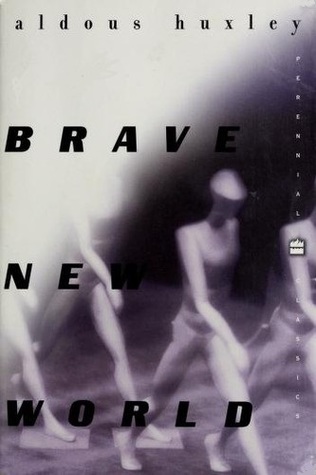
Brave New World by Aldous Huxley , Felisberto Albuquerque (Translator)
Brave New World is a dystopian novel written in 1931 by English author Aldous Huxley, and published in 1932. Largely set in a futuristic World State of genetically modified citizens and an intelligence-based social hierarchy, the novel anticipates huge scientific developments in reproductive technology, sleep-learning, psychological manipulation, and classical conditioning Brave New World is a dystopian novel written in 1931 by English author Aldous Huxley, and published in 1932. Largely set in a futuristic World State of genetically modified citizens and an intelligence-based social hierarchy, the novel anticipates huge scientific developments in reproductive technology, sleep-learning, psychological manipulation, and classical conditioning that are combined to make a utopian society that goes challenged only by a single outsider.
I WANT TO READ THIS
Utopia by Thomas More , Paul Turner (Annotations)
Utopia (Libellus vere aureus, nec minus salutaris quam festivus, de optimo rei publicae statu deque nova insula Utopia) is a satirical work of fiction and political philosophy by Thomas More (1478–1535) published in 1516 in Latin. The book is a frame narrative primarily depicting a fictional island society as described by the character Raphael Hythloday who lived there som Utopia (Libellus vere aureus, nec minus salutaris quam festivus, de optimo rei publicae statu deque nova insula Utopia) is a satirical work of fiction and political philosophy by Thomas More (1478–1535) published in 1516 in Latin. The book is a frame narrative primarily depicting a fictional island society as described by the character Raphael Hythloday who lived there some years, who describes and its religious, social and political customs.
I WANT TO READ THIS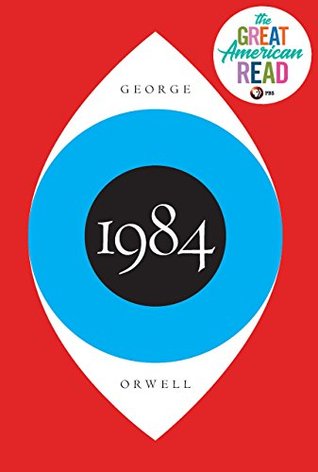
1984 by George Orwell
Alternate cover edition of ASIN B003JTHWKU For previous cover edition see here Among the seminal texts of the 20th century, Nineteen Eighty-Four is a rare work that grows more haunting as its futuristic purgatory becomes more real. Published in 1949, the book offers political satirist George Orwell's nightmarish vision of a totalitarian, bureaucratic world and one poor stiff Alternate cover edition of ASIN B003JTHWKU For previous cover edition see here Among the seminal texts of the 20th century, Nineteen Eighty-Four is a rare work that grows more haunting as its futuristic purgatory becomes more real. Published in 1949, the book offers political satirist George Orwell's nightmarish vision of a totalitarian, bureaucratic world and one poor stiff's attempt to find individuality. The brilliance of the novel is Orwell's prescience of modern life—the ubiquity of television, the distortion of the language—and his ability to construct such a thorough version of hell. Required reading for students since it was published, it ranks among the most terrifying novels ever written.
I WANT TO READ THIS
The Dispossessed by Ursula K. Le Guin
Shevek, a brilliant physicist, decides to take action. He will seek answers, question the unquestionable, and attempt to tear down the walls of hatred that have isolated his planet of anarchists from the rest of the civilized universe. To do this dangerous task will mean giving up his family and possibly his life--Shevek must make the unprecedented journey to the utopian m Shevek, a brilliant physicist, decides to take action. He will seek answers, question the unquestionable, and attempt to tear down the walls of hatred that have isolated his planet of anarchists from the rest of the civilized universe. To do this dangerous task will mean giving up his family and possibly his life--Shevek must make the unprecedented journey to the utopian mother planet, Urras, to challenge the complex structures of life and living, and ignite the fires of change.
I WANT TO READ THIS
Island by Aldous Huxley
In Island, his last novel, Huxley transports us to a Pacific island where, for 120 years, an ideal society has flourished. Inevitably, this island of bliss attracts the envy and enmity of the surrounding world. A conspiracy is underway to take over Pala, and events begin to move when an agent of the conspirators, a newspaperman named Faranby, is shipwrecked there. What Far In Island, his last novel, Huxley transports us to a Pacific island where, for 120 years, an ideal society has flourished. Inevitably, this island of bliss attracts the envy and enmity of the surrounding world. A conspiracy is underway to take over Pala, and events begin to move when an agent of the conspirators, a newspaperman named Faranby, is shipwrecked there. What Faranby doesn't expect is how his time with the people of Pala will revolutionize all his values and—to his amazement—give him hope.
I WANT TO READ THIS
Herland by Charlotte Perkins Gilman , Ann J. Lane (Introduction)
An all-female society is discovered somewhere in the distant reaches of the earth by three male explorers who are now forced to re-examine their assumptions about women's roles in society.
I WANT TO READ THIS
Looking Backward: 2000-1887 by Edward Bellamy , Walter James Miller (Introduction)
Edward Bellamy's classic look at the future has been translated into over twenty languages and is the most widely read novel of its time. A young Boston gentleman is mysteriously transported from the nineteenth to the twenty-first century -- from a world of war and want to one of peace and plenty. This brilliant vision became the blueprint of utopia that stimulated some of Edward Bellamy's classic look at the future has been translated into over twenty languages and is the most widely read novel of its time. A young Boston gentleman is mysteriously transported from the nineteenth to the twenty-first century -- from a world of war and want to one of peace and plenty. This brilliant vision became the blueprint of utopia that stimulated some of the greatest thinkers of our age.
I WANT TO READ THIS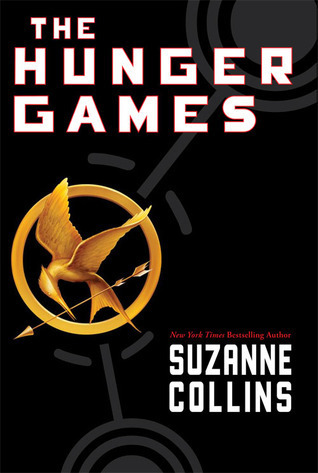
The Hunger Games by Suzanne Collins
Could you survive on your own, in the wild, with everyone out to make sure you don't live to see the morning? In the ruins of a place once known as North America lies the nation of Panem, a shining Capitol surrounded by twelve outlying districts. The Capitol is harsh and cruel and keeps the districts in line by forcing them all to send one boy and one girl between the ages Could you survive on your own, in the wild, with everyone out to make sure you don't live to see the morning? In the ruins of a place once known as North America lies the nation of Panem, a shining Capitol surrounded by twelve outlying districts. The Capitol is harsh and cruel and keeps the districts in line by forcing them all to send one boy and one girl between the ages of twelve and eighteen to participate in the annual Hunger Games, a fight to the death on live TV. Sixteen-year-old Katniss Everdeen, who lives alone with her mother and younger sister, regards it as a death sentence when she is forced to represent her district in the Games. But Katniss has been close to dead before - and survival, for her, is second nature. Without really meaning to, she becomes a contender. But if she is to win, she will have to start making choices that weigh survival against humanity and life against love. New York Times bestselling author Suzanne Collins delivers equal parts suspense and philosophy, adventure and romance, in this searing novel set in a future with unsettling parallels to our present. (front flap)
I WANT TO READ THIS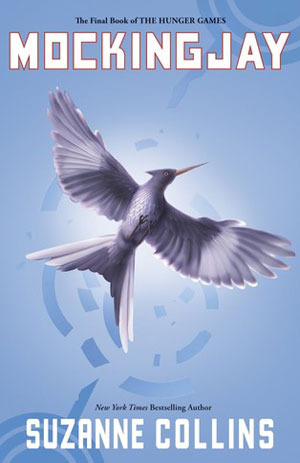
Mockingjay by Suzanne Collins
My name is Katniss Everdeen. Why am I not dead? I should be dead. Katniss Everdeen, girl on fire, has survived, even though her home has been destroyed. Gale has escaped. Katniss's family is safe. Peeta has been captured by the Capitol. District 13 really does exist. There are rebels. There are new leaders. A revolution is unfolding. It is by design that Katniss was rescued fr My name is Katniss Everdeen. Why am I not dead? I should be dead. Katniss Everdeen, girl on fire, has survived, even though her home has been destroyed. Gale has escaped. Katniss's family is safe. Peeta has been captured by the Capitol. District 13 really does exist. There are rebels. There are new leaders. A revolution is unfolding. It is by design that Katniss was rescued from the arena in the cruel and haunting Quarter Quell, and it is by design that she has long been part of the revolution without knowing it. District 13 has come out of the shadows and is plotting to overthrow the Capitol. Everyone, it seems, has had a hand in the carefully laid plans--except Katniss. The success of the rebellion hinges on Katniss's willingness to be a pawn, to accept responsibility for countless lives, and to change the course of the future of Panem. To do this, she must put aside her feelings of anger and distrust. She must become the rebels' Mockingjay--no matter what the personal cost.
I WANT TO READ THIS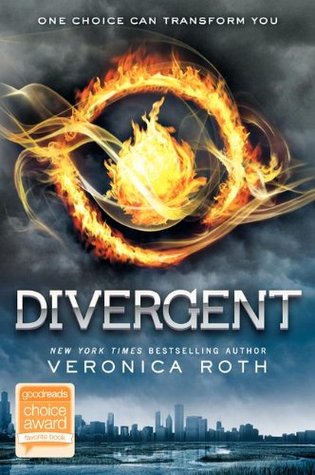
Divergent by Veronica Roth
In Beatrice Prior's dystopian Chicago world, society is divided into five factions, each dedicated to the cultivation of a particular virtue—Candor (the honest), Abnegation (the selfless), Dauntless (the brave), Amity (the peaceful), and Erudite (the intelligent). On an appointed day of every year, all sixteen-year-olds must select the faction to which they will devote the In Beatrice Prior's dystopian Chicago world, society is divided into five factions, each dedicated to the cultivation of a particular virtue—Candor (the honest), Abnegation (the selfless), Dauntless (the brave), Amity (the peaceful), and Erudite (the intelligent). On an appointed day of every year, all sixteen-year-olds must select the faction to which they will devote the rest of their lives. For Beatrice, the decision is between staying with her family and being who she really is—she can't have both. So she makes a choice that surprises everyone, including herself. During the highly competitive initiation that follows, Beatrice renames herself Tris and struggles alongside her fellow initiates to live out the choice they have made. Together they must undergo extreme physical tests of endurance and intense psychological simulations, some with devastating consequences. As initiation transforms them all, Tris must determine who her friends really are—and where, exactly, a romance with a sometimes fascinating, sometimes exasperating boy fits into the life she's chosen. But Tris also has a secret, one she's kept hidden from everyone because she's been warned it can mean death. And as she discovers unrest and growing conflict that threaten to unravel her seemingly perfect society, she also learns that her secret might help her save those she loves . . . or it might destroy her.
I WANT TO READ THIS
Fahrenheit 451 by Ray Bradbury
Guy Montag is a fireman. In his world, where television rules and literature is on the brink of extinction, firemen start fires rather than put them out. His job is to destroy the most illegal of commodities, the printed book, along with the houses in which they are hidden. Montag never questions the destruction and ruin his actions produce, returning each day to his bland Guy Montag is a fireman. In his world, where television rules and literature is on the brink of extinction, firemen start fires rather than put them out. His job is to destroy the most illegal of commodities, the printed book, along with the houses in which they are hidden. Montag never questions the destruction and ruin his actions produce, returning each day to his bland life and wife, Mildred, who spends all day with her television 'family'. But then he meets an eccentric young neighbor, Clarisse, who introduces him to a past where people did not live in fear and to a present where one sees the world through the ideas in books instead of the mindless chatter of television. When Mildred attempts suicide and Clarisse suddenly disappears, Montag begins to question everything he has ever known.
I WANT TO READ THIS